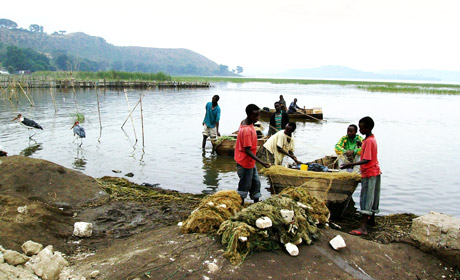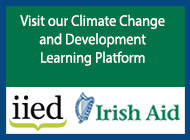Climate Action : Irish Aid supports locals to restore damaged land around Lake Hawassa
13/11/15
Climate Action: Fishermen in Lake Hawassa, Ethiopia. Photo: Achili family
Lake Hawassa and its surrounding area in southern Ethiopia has suffered from environmental damage and climate change, with its soil, water and forest resources damaged by the expansion of agricultural land. An Irish Aid supported programme is helping to restore damaged land, to the benefit of over 40,000 locals, including small farmers and landless youth.
Irish Aid is supporting a group of Non-Governmental Organisations - SOS Sahel Ethiopia, Self Help Africa, Farm Africa and VITA – with funding of €1 million to rehabilitate the environment around Lake Hawassa.
The shift to agricultural production is driven mainly by population pressure, an increased demand for timber for fuel and construction, and ineffective policy on access and control over land resources. Land clearance and climate change has left the area vulnerable to soil erosion and land degradation.
The programme aims to reduce poverty in the long term by supporting the community to implement soil and water conservation measures, and to rehabilitate the large gulleys that have formed from soil erosion.
The programme will benefit over 40,000 locals around Lake Hawassa
The programme is built on three key pillars: increasing productivity and income, enhancing resilience of livelihoods through climate change adaptation and reducing the agricultural contribution to climate change.
The programme is also promoting inclusive and equitable land use management to ensure secure access and control over communal lands for landless youth and smallholder farmers. In addition, seedling nurseries have been established around the lake to supply youth with seedlings and to rehabilitate degraded land.
Over 5,600 hectares of land are under rehabilitation and over 5,000 youth and smallholder farmers have already directly benefited from income-generating activities and climate smart agricultural approaches.
Analysis of satellite date for Lake Hawassa for the period 1965 – 2001 has revealed that approximately 45% of natural vegetation was cleared for agricultural production and overgrazing.
Specific challenges for the sustainability of Lake Hawassa include fluctuations in the lake water level due to climate change, pollution from industry and domestic waste, and depletion of fish stocks.
This article is part of a Climate Action series focussing on the work of Irish Aid to help poor communities tackle the effects of climate change, published as the UN Climate Conference takes place in Paris.
Learn more about our work in Ethiopia, our Country Climate Action Report for Ethiopia, and the work of Irish Aid in combatting climate change.
Visit the Irish Aid Climate and Development Learning Platform for in-depth information on designing and implementing country-driven, results-orientated and sustainable learning to address climate change. This platform is a collaborative initiative involving Irish Aid, the International Institute for Policy and Development, Irish Aid key partner countries and Irish Aid Partner Organisations.


